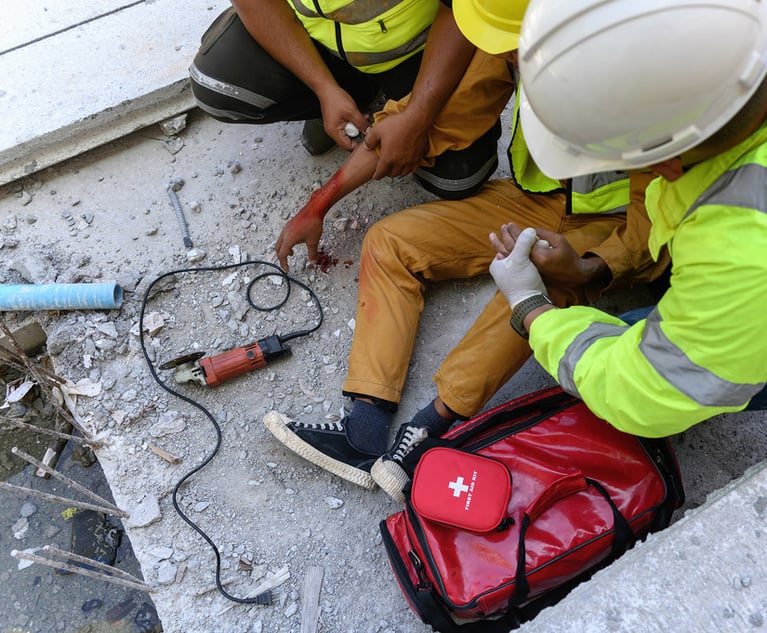State Can Bring Fraud Action Against Superstorm Sandy Contractor, Appeals Court Rules
A New Jersey appellate court has ruled that the state may proceed with a consumer fraud action against a Superstorm Sandy contractor – and that consumers may not be barred from initiating criminal complaints against the contractor.
July 29, 2019 at 12:00 PM
6 minute read
The original version of this story was published on Law.com
 Hurricane Sandy – Credit: NOAA/NASA
Hurricane Sandy – Credit: NOAA/NASA
This story is reprinted with permission from the Insurance Coverage Law Center, the industry's only comprehensive digital resource designed for insurance coverage law professionals. Visit the website to subscribe.
An appellate court in New Jersey, reversing a trial court's decision, has ruled that the state may proceed with a consumer fraud action against a Superstorm Sandy contractor—and that consumers may not be barred from initiating criminal complaints against the contractor.
The Case
After Superstorm Sandy struck in October 2012, the New Jersey Division of Consumer Affairs (the “Division”) created the Reconstruction, Rehabilitation, Elevation and Migration (“RREM”) Program to provide homeowners with up to $150,000 in grant money to repair damage to their homes. Under the program, homeowners were permitted to select an approved private contractor of their choice.
Over the course of four years, the Division received nine complaints from homeowners that repairs made by George Rex and Atlantic Coast House Lifting LLC were carelessly completed, incomplete, or non-compliant with state and municipal building codes.
Consequently, the New Jersey Attorney General and the Division (together, the “State”) filed a lawsuit against Rex and Atlantic Coast in February 2018, alleging violations of the New Jersey Consumer Fraud Act (the “CFA”) and other state laws and seeking to permanently enjoin their business operations and monetary damages.
Concerned about the prospects of future criminal complaints, Rex invoked his Fifth Amendment right against self-incrimination, and refused the State's requests to depose him as part of the CFA action. The defendants also moved for a stay of the civil action pending tolling of the five-year statute of limitations period for criminal complaints the nine homeowners could potentially file.
The trial court granted the defendants' motion to stay the civil proceedings.
The trial court also issued an order to show cause (“OTSC”) that provided that the nine homeowners would be barred from asserting a claim in “any police report and/or [criminal] complaint to any law enforcement agency” against the defendants arising from the work performed at their homes if they failed to come forward with a claim on or before October 17, 2018.
The State appealed, raising two arguments.
First, the State contended that the trial court had abused its discretion when it granted the defendants' motion to stay the civil proceedings. Second, it contended that the trial court had erred as a matter of law in granting the OTSC (which was stayed pending the State's appeal).
The Decision
The appellate court reversed.
In its July 18 decision, the appellate court first addressed the stay of the civil proceedings the State brought against the defendants.
The appellate court explained that the decision to stay a civil action due to the pendency of a criminal action was not constitutionally required but, rather, rested in the sound discretion of the trial court. Moreover, the appellate court continued, it was not a violation of the Fifth Amendment or Due Process to require a defendant to make the choice to testify, even though giving testimony at a civil proceeding might help criminal prosecutors, as opposed to invoking his or her Fifth Amendment rights and suffering any adverse civil consequences that flowed therefrom.
Here, the appellate court observed, there were no known ongoing criminal investigations or indictments against the defendants. The appellate court also pointed out that, in exercising its statutory responsibility under the CFA, the State was “seeking to protect the public from defendants due to their alleged violations by enjoining their contracting businesses from operating, and recouping taxpayer monies paid to homeowners under the RREM program.” In the appellate court's view, this “clearly” weighed in favor of allowing this matter to proceed to conclusion “without waiting for the indefinite period of a stay and resulting in the possibility of delaying civil justice to the citizens of New Jersey.”
Therefore, the appellate court concluded that the trial court had “mistakenly applied its discretion in ordering a stay.”
The appellate court next decided that the trial court's imposition of the OTSC requiring the nine homeowners to show cause was impermissible under the law and unduly benefited the defendants at the expense of the homeowners and punished the homeowners because the state had filed suit.
According to the appellate court, although the OTSC did not specifically mention a complete bar, it was “essentially a permanent injunction against the homeowners filing criminal complaints against defendants if they did not assert any criminal or quasi-criminal complaints” as it directed that any such complaints “must be filed” by the specified date.
The appellate court added that the OTSC was overbroad, noting that it barred homeowners from asserting a claim in “any police report and/or [criminal] complaint to any law enforcement agency” and any claims against the defendants arising from the work performed at their homes, despite the fact that such claims might not have been ripe before the trial court's mandated cut-off date. Consequently, the appellate court said, the OTSC “would clearly benefit defendants to the prejudice of the homeowners.” It concluded that there was “no viable purpose for giving this advantage to defendants over the individuals they allegedly took advantage of who were already dealing with the trauma and life changing experience they suffered by their hurricane-ravaged homes.”
The case is Grewal v. Atlantic Coast House Lifting LLC, No. A-5881-17T4 (N.J. Ct. App. July 18, 2019). Attorneys involved include: Jeffrey Alan Koziar, Deputy Attorney General, argued the cause for appellants (Gurbir S. Grewal, Attorney General, attorney; Jason Wade Rockwell, Assistant Attorney General, of counsel; Lorraine K. Rak, Deputy Attorney General, and Mark E. Critchley, Deputy Attorney General, on the briefs). Katrine L. Hyde argued the cause for respondents (Kennedys CMK LLP, attorneys; David M. Kupfer, Katrine L. Hyde and Elizabeth H. Rohan, of counsel and on the brief).
Steven A. Meyerowitz, a Harvard Law School graduate, is the founder and president of Meyerowitz Communications Inc., a law firm marketing communications consulting company. Mr. Meyerowitz is the Director of the Insurance Coverage Law Center and editor-in-chief of journals on insurance law, banking law, bankruptcy law, energy law, government contracting law, and privacy and cybersecurity law, among other subjects. He may be contacted at [email protected].
This content has been archived. It is available through our partners, LexisNexis® and Bloomberg Law.
To view this content, please continue to their sites.
Not a Lexis Subscriber?
Subscribe Now
Not a Bloomberg Law Subscriber?
Subscribe Now
NOT FOR REPRINT
© 2025 ALM Global, LLC, All Rights Reserved. Request academic re-use from www.copyright.com. All other uses, submit a request to [email protected]. For more information visit Asset & Logo Licensing.
You Might Like
View All

'A More Nuanced Issue': NJ Supreme Court Considers Appellate Rules for Personal Injury Judgments
5 minute read
Appellate Division Rejects Third Circuit Interpretation of NJ Law, Says No Arbitration for Insurance Fraud
4 minute readTrending Stories
- 1States Accuse Trump of Thwarting Court's Funding Restoration Order
- 2Microsoft Becomes Latest Tech Company to Face Claims of Stealing Marketing Commissions From Influencers
- 3Coral Gables Attorney Busted for Stalking Lawyer
- 4Trump's DOJ Delays Releasing Jan. 6 FBI Agents List Under Consent Order
- 5Securities Report Says That 2024 Settlements Passed a Total of $5.2B
Who Got The Work
J. Brugh Lower of Gibbons has entered an appearance for industrial equipment supplier Devco Corporation in a pending trademark infringement lawsuit. The suit, accusing the defendant of selling knock-off Graco products, was filed Dec. 18 in New Jersey District Court by Rivkin Radler on behalf of Graco Inc. and Graco Minnesota. The case, assigned to U.S. District Judge Zahid N. Quraishi, is 3:24-cv-11294, Graco Inc. et al v. Devco Corporation.
Who Got The Work
Rebecca Maller-Stein and Kent A. Yalowitz of Arnold & Porter Kaye Scholer have entered their appearances for Hanaco Venture Capital and its executives, Lior Prosor and David Frankel, in a pending securities lawsuit. The action, filed on Dec. 24 in New York Southern District Court by Zell, Aron & Co. on behalf of Goldeneye Advisors, accuses the defendants of negligently and fraudulently managing the plaintiff's $1 million investment. The case, assigned to U.S. District Judge Vernon S. Broderick, is 1:24-cv-09918, Goldeneye Advisors, LLC v. Hanaco Venture Capital, Ltd. et al.
Who Got The Work
Attorneys from A&O Shearman has stepped in as defense counsel for Toronto-Dominion Bank and other defendants in a pending securities class action. The suit, filed Dec. 11 in New York Southern District Court by Bleichmar Fonti & Auld, accuses the defendants of concealing the bank's 'pervasive' deficiencies in regards to its compliance with the Bank Secrecy Act and the quality of its anti-money laundering controls. The case, assigned to U.S. District Judge Arun Subramanian, is 1:24-cv-09445, Gonzalez v. The Toronto-Dominion Bank et al.
Who Got The Work
Crown Castle International, a Pennsylvania company providing shared communications infrastructure, has turned to Luke D. Wolf of Gordon Rees Scully Mansukhani to fend off a pending breach-of-contract lawsuit. The court action, filed Nov. 25 in Michigan Eastern District Court by Hooper Hathaway PC on behalf of The Town Residences LLC, accuses Crown Castle of failing to transfer approximately $30,000 in utility payments from T-Mobile in breach of a roof-top lease and assignment agreement. The case, assigned to U.S. District Judge Susan K. Declercq, is 2:24-cv-13131, The Town Residences LLC v. T-Mobile US, Inc. et al.
Who Got The Work
Wilfred P. Coronato and Daniel M. Schwartz of McCarter & English have stepped in as defense counsel to Electrolux Home Products Inc. in a pending product liability lawsuit. The court action, filed Nov. 26 in New York Eastern District Court by Poulos Lopiccolo PC and Nagel Rice LLP on behalf of David Stern, alleges that the defendant's refrigerators’ drawers and shelving repeatedly break and fall apart within months after purchase. The case, assigned to U.S. District Judge Joan M. Azrack, is 2:24-cv-08204, Stern v. Electrolux Home Products, Inc.
Featured Firms
Law Offices of Gary Martin Hays & Associates, P.C.
(470) 294-1674
Law Offices of Mark E. Salomone
(857) 444-6468
Smith & Hassler
(713) 739-1250







